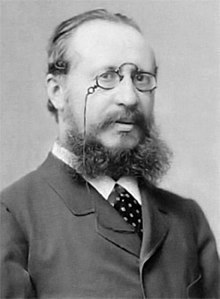Kálmán Széll
Kálmán (Koloman) Széll (born June 8, 1843 in Gasztony , Vas County ; † August 16, 1915 in Rátót , Vas County) was a politician, banker and Prime Minister of Hungary from 1899 to 1903 .
Life

Széll initially pursued the career of a judge , but later specialized in financial matters. He became a follower of his "father-in-law", Ferenc Deák . His wife Ilona Vörösmarty (1846–1910), daughter of the poet Mihály Vörösmarty , who died in 1855 , was a ward of Deáks. The marriage was concluded in 1867 and the couple had a daughter, Ilona.
Since the reopening of the Hungarian Reichstag in 1865 he was a member of parliament and from March 2, 1875 to October 4, 1878 Minister of Finance in the Kálmán Tisza government . However, because of the occupation of Bosnia-Herzegovina , he resigned. He remained a member of the Liberal Party until 1911 and worked as a banker in Vienna . Széll campaigned for the construction of the Győr − Szombathely − Sopron railway line . In 1896 he headed the Hungarian delegation in the unsuccessful regular balancing negotiations with Austria .
After the resignation of Dezső Bánffy , Széll was appointed Prime Minister by King Franz Joseph I on February 26, 1899 and was able to quickly end the obstruction of the opposition to the government. He carried out a tax reform and a new regulation of the finance and banking system. He was the first head of government who specifically tried to reduce the influence of the minority financial institutions , especially the Slovak Tatra Banka . As far as the other coercive measures of the Magyarization were concerned, Széll was far more moderate in their implementation than his predecessor. It was not until the end of 1902 that Széll was able to conclude the compensation negotiations by compromising the quota with the Austrian government, Ernest von Koerber . Nevertheless, he had to resign in June 1903 because of ongoing problems with financial equalization.
literature
- O. Zobel: Széll, Kálmán. In: Biographical Lexicon on the History of Southeast Europe. Volume 4, Munich 1981, pp. 258-260.
Individual evidence
- ↑ a b biography on szentgotthard ( memento from July 31, 2009 in the Internet Archive )
- ^ Ernst Rutkowski: Letters and documents on the history of the Austro-Hungarian monarchy. Volume 1: The Constitutionally Loyal Large Estate 1880–1899. Verlag Oldenbourg, Munich 1983, ISBN 3-486-51831-3 , p. 273.
- ^ A b Peter F. Sugar (Ed.): A history of Hungary. Indiana University Press, Bloomington 1990, ISBN 0-253-20867-X , p. 273.
- ^ Ágnes Pogány, Eduard Kubů, Jan Kofman: For a national economy. Hungary, Czechoslovakia and Poland from the end of the 19th century to the Second World War. Berliner Wissenschaftlicher Verlag, Berlin 2006, ISBN 3-8305-1250-3 , p. 34.
- ^ Günter Schödl: Pan-German Association and German Minority Policy in Hungary, 1890-1914. On the history of German “extreme nationalism”. Lang, Frankfurt am Main 1978, ISBN 3-261-02391-0 , p. 32.
| personal data | |
|---|---|
| SURNAME | Széll, Kálmán |
| ALTERNATIVE NAMES | Széll, Koloman |
| BRIEF DESCRIPTION | Austro-Hungarian politician |
| DATE OF BIRTH | June 8, 1843 |
| PLACE OF BIRTH | Gasztony , Vas county |
| DATE OF DEATH | August 16, 1915 |
| Place of death | Rátót , Vas county |

